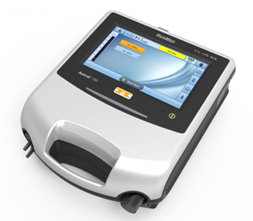Planned maintenance may cause outages to the Department of Health and Aged Care’s network from 5:15 pm AEDT on 30 November to 10:00 pm AEDT on 1 December 2024. Access to TGA databases such as TBS Portal, ARTG and DAEN may be affected. We apologise for any inconvenience.
Consumers and health professionals are advised that ResMed, in consultation with the TGA, has initiated a recall for product correction in relation to its Astral 100 and Astral 150 ventilators due to an internal battery issue. ResMed will address this issue by replacing the internal battery in in all Astral 100 and Astral 150 ventilators currently in use as part of the routine maintenance service. This will commence in September 2016.
Astral 100 and Astral 150 ventilators provide support to patients with respiratory difficulties resulting from health conditions of varying severity. They can be used in both health facilities and home settings.

These ventilators have an internal battery that is designed to deliver continuous power when AC power is disrupted or when a patient is mobile (for example, in a wheelchair).
The internal battery is intended to provide power for up to eight hours under normal conditions. When a ventilator is being used with the internal battery as the sole power source, the 'low battery' alarm is designed to activate when there are 20 minutes of ventilation time remaining and the 'critically low battery' alarm is designed to activate when there are 10 minutes of ventilation time remaining.
ResMed has received a number of reports regarding the performance of the internal battery in Astral 100 and Astral 150 ventilators. According to these reports, an internal electrical issue has led to ventilation stopping without either the 'low battery' or 'critically low battery' alarms activating as intended.
If ventilation stops without prior warning, 'ventilator-dependent' patients who are using the internal battery as the sole power source (for example, during mobile use or when AC power is unavailable or interrupted) may be at risk of serious health problems.
The risk of this occurring is increased if the internal battery has been charged a high number of times.
Astral 100 and Astral 150 ventilators can be used with an external battery (in addition to the internal battery), which is intended to provide an additional eight hours of power. While there have also been reports of the above fault with external batteries, there have been no reports of loss of therapy when an external battery has been used.
The ventilators should have a routine maintenance service every two years in accordance with the device's User Guide. Beginning September 2016, local service providers will be contacting patients to schedule replacement of affected batteries, either at the next normal routine maintenance service (if due within the next three months) or at a separate appointment. All ventilators should have their internal batteries replaced by no later than 1 December 2016.
In the meantime, ResMed is recommending that patients or their carers take certain precautions to minimise risks (see 'Information for consumers' below).
As of 17 August 2016, ResMed has not received any reports of patients experiencing adverse events as a result of this issue.
Information for consumers
If you or someone you provide care for uses an Astral 100 or Astral 150 ventilator, be aware of this issue.
From September 2016, you should be contacted by your local service provider to schedule replacement of the internal battery. You can continue to use your ventilator in the meantime.
However, ResMed recommends that the following precautions be taken to minimise risks (especially for ventilator-dependent patients):
- Connect the ventilator to AC power whenever possible. In the event of battery failure, connect to AC power immediately to resume ventilation.
- For ventilator-dependent patients, use an external power source (Astral External Battery or RPSII battery) including when AC power is unavailable or interrupted.
- Use an external power source in mobile situations. Do not rely solely on the internal battery for mobile use.
- Ensure the external battery source is sufficiently charged before using in mobile situations.
- For ventilator-dependent patients, always have alternate ventilation equipment available, such as a back-up ventilator, manual resuscitator or similar device.
- Ventilator-dependent patients should be continuously monitored by qualified personnel or adequately trained carers. These personnel and carers must be capable of taking the necessary corrective action in the event of a ventilator alarm or malfunction.
- Return the ventilator to a service provider if it displays any notifications of battery issues or significant degradation in battery performance.
If you have any questions or concerns about this issue, speak to the supplier of your device or your local service provider. Alternatively, contact ResMed on 1300 305 705.
Information for health professionals and health facilities
If you are treating a patient who uses an Astral 100 or Astral 150 ventilator, be aware of this issue.
Advise patients that this issue will be addressed when the internal battery is replaced, but that they can continue to use their ventilator in the meantime. However, urge patients (especially ventilator-dependent patients) to undertake the precautions outlined above in the 'Information for consumers' section.
If you have any questions or concerns about this issue, speak to the supplier of the device or your local service provider. Alternatively, contact ResMed on 1300 305 705.
Reporting problems
Consumers and health professionals are encouraged to report problems with medical devices. Your report will contribute to the TGA's monitoring of these products. For more information, see the TGA Incident Reporting and Investigation Scheme (IRIS).
The TGA cannot give advice about an individual's medical condition. You are strongly encouraged to talk with a health professional if you are concerned about a possible adverse event associated with a medical device.



